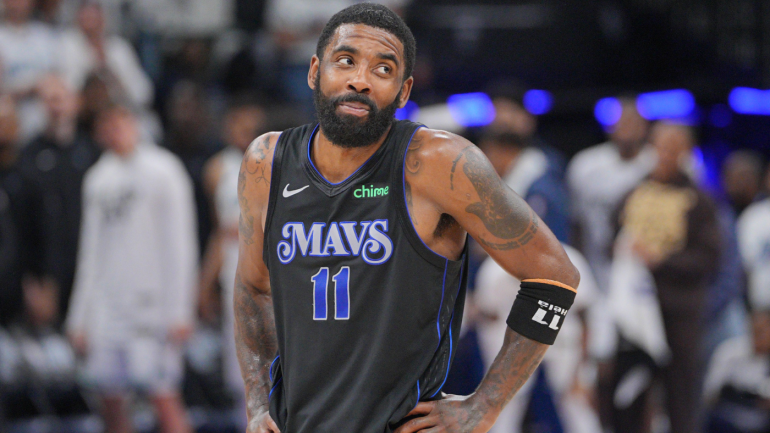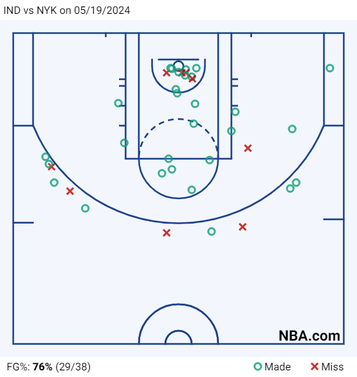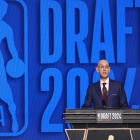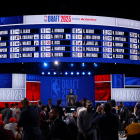
The paths of the two teams meeting in the NBA Finals couldn't have been more disparate. The Boston Celtics were pre-season favorites, put together an all-time regular season and cruised their way to a 12-2 playoff record against Eastern Conference competition to arrive at the destination where everyone expected them to be. On the other side, we have a Dallas Mavericks squad that was 26-23 at the beginning of February before receiving a trade-deadline jolt that transformed them into a team that slayed the top-seeded Oklahoma City Thunder and the upstart Minnesota Timberwolves (who had just eliminated the defending champs).
The Mavs haven't been the only surprise in this year's playoffs, however. From the first round -- which it's hard to believe started almost two months ago -- to the conference finals, we've seen shocking developments at every turn. As we prepare to watch Luka Doncic, Kyrie Irving and the red-hot Mavericks take on the juggernaut Celtics helmed by Jayson Tatum and Jaylen Brown, here's a look back at some of the biggest surprises of the NBA playoffs so far.
Kyrie Irving's defense
We could list the entire Mavericks defense here as a major surprise, but they did have the NBA's best defensive rating over the final 15 games of the regular season, so at least there were signs that this was possible. Instead, we'll focus on Irving, who was long considered to be nothing more than an object to be picked on, bullied and battered on defense. Part of the skepticism following Irving's trade to Dallas was that the defensive deficiencies of a backcourt comprised of him and Luka Doncic would have a limited playoff ceiling.
Irving has catapulted that pessimism into the stratosphere with his performance during the 2024 postseason, as the Mavericks prepare for the NBA Finals. Dallas' defense has seen zero drop-off with Irving on the floor, allowing 110 points per 100 possessions. Combine that with his astronomically positive impact on the other end (offensive rating has gone from 90 without him to 118 with him on the floor), and you get a sense of why the Mavericks have been so dominant this postseason.
Much of Irving's success defensively is the product of increased effort -- he's said multiple times that his goal of becoming one of the greatest players of all time meant that he needed to bring equal energy on both ends of the floor. He's also displayed some ferociously quick hands, which has led to 20 steals throughout the postseason, fourth in the NBA (Doncic is first with 28).
To make up for his lack of vertical rim protection, Irving has mastered the art of the swipe-down block in traffic.
The Mavericks wouldn't be where they are without their defense and -- believe it or not -- Irving is a huge reason why they've been so difficult to score against.
Suns' offensive disaster
Lest we forget, the Phoenix Suns were favored to beat the Minnesota Timberwolves in the first round. Instead, they lost four straight games by an average of 15 points. The Wolves were probably better than a lot of people thought ... but it turns out Phoenix was also much worse.
The vaunted Suns offense featuring Kevin Durant, Devin Booker and Bradley Beal -- purportedly the antidote for even the most stout defense -- averaged an exiguous 109 points per 100 possessions, ranking 12th out of 16 playoff teams. Even worse, with Durant, Booker and Beal on the court the Suns put up just 107 points per 100 possessions while allowing 125, for an embarrassing minus-18 net rating in 125 minutes.
The team never jelled consistently during the regular season, and the playoffs served as a referendum on the idea of putting the three score-first stars around a piecemeal supporting cast. Durant was displeased with his role with the team, according to The Athletic, and he suggested as much after the conclusion of the first-round sweep.
"We just was inconsistent with our play and the style of play that we wanted," Durant said after the Game 4 loss. "But that's as far as I'll go."
Ten days later, Suns head coach Frank Vogel was fired.
The stars were relatively efficient and productive in the series against Minnesota, but the Suns received minimal contributions from role players. The highest scoring average from anyone outside of Booker, Durant and Beal was Eric Gordon's eight points per game. Clearly the Phoenix front office will have to figure out the rest of this roster over the summer following the shockingly subpar performance in its first-round exit.
Nuggets' Game 7 collapse
After completely flipping the series with three straight wins -- two on the road -- the Nuggets seemed poised to cut the upstart Timberwolves down to size and prove their championship mettle once again. Even after a blowout loss in Game 6, confidence was high that Denver would be able to finish off the series at home -- especially after they got out to an early 20-point lead in Game 7.
What ensued was difficult to watch for Nuggets fans, as the Wolves smothered them in the second half, leading to one of the most shocking come-from-behind victories in recent playoff memory. It concluded with Anthony Edwards eliciting the attention of Nikola Jokic after he waved goodbye to the Denver crowd -- and the Nuggets' hopes of a repeat.
In the end the Wolves were the better team, which isn't something a lot of people were saying heading into the series.
Jamal Murray's struggles
Heading into this postseason, Jamal Murray carried career playoff averages of 25 points, six assists and five rebounds on highly efficient 47/40/91 shooting splits. Whether it was a nagging calf injury, stout defenses or just cold shooting, Murray had an uncharacteristically rough time in Denver's two playoff rounds this year, averaging 21 points while shooting just 40% from the field and 31.5% from 3-point range. He was something of a bellwether for Denver, putting 22 points per game on 36% 3-point shooting in their wins and 18 points on 26% from deep in their losses.
We're used to "Playoff Jamal" emerging every April, but for some reason it just wasn't happening for the star point guard this time around -- and it cost the Nuggets dearly.
Josh Hart's shooting
For all of his myriad talents, nobody has ever confused Josh Hart for a knock-down shooter. He made just 31% of his 3-point attempts during the regular season for the Knicks, and has shot 34% for his career. All of that changed this postseason, however, when Hart occasionally transformed into Kyle Korver, ripping the hearts out of defenses whose entire goal was to make him shoot.
The six-year pro shot 37% from 3-point range on 4.5 attempts per game, a more accurate postseason mark than Jaylen Brown, Karl-Anthony Towns and Khris Middleton. Hart set the tone for what was to come in Game 1 of their first-round series against the Philadelphia 76ers, when he made three 3s in the final five minutes, including the improbable dagger with a minute left.
Chances are Hart's percentages will go back to where they were over the course of next season, but he changed the landscape of the playoffs this year with his hot shooting.
Celtics stunned in Boston -- twice
What is with the Celtics and Game 2? In the first round, they were absolutely blown off their home floor by the Miami Heat, who were playing without Jimmy Butler and Terry Rozier, among others. Then in the second round they did nearly the exact same thing, losing to the Cavaliers by 24 points at home after leading by nine in the first half.
Obviously, the Celtics turned out just fine, as those ended up being the team's only two losses of the postseason thus far, but the alarming performances raised significant alarm bells at the time. Oddly enough, while the Celtics have made the conference finals in each of the last three seasons, their home playoff record is just 17-14 over that span. This is a team that went 37-4 at home during the 2023-24 regular season. Strange things happen in the postseason.
Pacers go nuclear at MSG
One way to win a Game 7 at Madison Square Garden is to make sure you just never miss a shot. Rick Carlisle clearly sent that message to his Pacers as they set an NBA record by shooting 67.1% from the field in their 130-109 win over the Knicks to advance to the Eastern Conference finals. Even more mind-boggling was the fact that Indiana missed just nine shots in the entire first half, going 29-for-38 (76%) from the field.

"To do that on the road here in the Garden in Game 7 obviously is phenomenal," Pacers center Myles Turner said after the game. "But I think this is what we've been doing all season long and we were able to show it on the biggest stage."
While they didn't keep up that torrid assault all postseason long, the Pacers still averaged 120 points per 100 possessions -- the most of any playoff team and right in line with their regular-season average, which is the second-best mark in NBA history. Just for a fun comparison, the Pacers averaged 141(!) points per 100 possessions in the Game 7 win. Ridiculous.


















